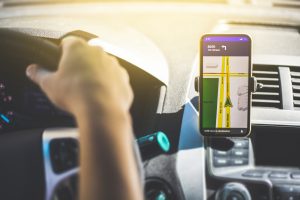
With so much information in the news about Lyft, Uber, and other rideshare companies, it can be hard to keep up. At Law Offices of Fernando D. Vargas we have represented the victims of car accidents involving rideshare cars. If you have questions about how these vehicles operate, and what happens if you are involved in an accident with one, keep reading. Then contact us at 909-982-0707 for a free legal consultation.
What Exactly are Lyft and Uber?
Let us start with the basics: Lyft and Uber are companies that use unique apps that pair up drivers with passengers who need a ride. Also known as a rideshare or ridesharing service, they are legally bundled in as “Transportation Network Companies.”
Are Lyft and Uber the Only Rideshare Companies?
Far from it. They may be the best well known, but there are twelve other licensed rideshare companies within the state. Three of them offer rideshare just for children, while the other nine are generally ride sharing programs like Lyft or Uber.
What is the Difference Between a Rideshare Company and a Taxi Company?
An Uber or Lyft driver uses their own vehicle to work. They can choose their own schedule and do not have to accept any ride or rider they do not want to. They are responsible for all of their own fuel, maintenance, and costs. Taxi drivers are required to pass licensing requirements that are not required of rideshare drivers.
There are also major differences in insurance policies. Taxis have a commercial insurance policy that is in effect 24 hours a day, every day of the year, no matter if the driver is on duty or not. With a ride share service, Uber or Lyft’s commercial policy applies only when the driver is actively working and has the app open. When the rideshare driver is driving on their own time, their own car insurance policy applies.
Who Can Be Held Liable if I Am in an Accident Involving a Rideshare Driver?
It depends on who caused the accident, whether the person who suffered injuries was a passenger when the accident occurred, and whether the driver was actively working for Uber or Lyft at the time of the accident. If the driver was on their own time, then their own insurance will cover them. If they had the app on and were actively carrying a passenger or looking for one, then the rideshare company’s insurance should kick in.
Call Today to Request a Free Legal Consultation
If you have been involved in any type of accident involving a rideshare vehicle, we strongly recommend that you contact Law Offices of Fernando D. Vargas at 909-982-0707 to request a free legal consultation. We can carefully consider your case, determine who is likely at fault, and give you the facts you need to make the most informed decision about how to continue.




